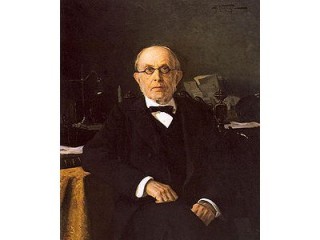
Konstantin Pobedonostsev biography
Date of birth : 1827-05-21
Date of death : 1907-03-23
Birthplace : Moscow, Russia
Nationality : Russian
Category : Historian personalities
Last modified : 2011-09-07
Credited as : statesman, jurist,
The Russian statesman and jurist Konstantin Petrovich Pobedonostsev as director general of the Holy Synod, became a champion of czarist autocracy, orthodoxy, and Russian nationalism.
Konstantin Pobedonostsev was born on May 21, 1827, in Moscow. His father, Peter V. Pobedonostsev, a professor at the University of Moscow, educated Konstantin at home until he enrolled at the St. Petersburg School of Jurisprudence in 1841. From his father, he learned to read Old Church Slavonic, French, Latin, and German. He also studied the Bible, the writings of the Russian Orthodox Church Fathers, Greek and Roman classics, Russian history, and Russian literature. He graduated from the School of Jurisprudence with a wide knowledge of Western judicial institutions, laws, and literatures.
Pobedonostsev first won acclaim as a historian of Russian judicial institutions and as a specialist in Russian civil law. In 1846 Pobedonostsev was assigned to the eighth department of the Senate in Moscow. In 1853 he became secretary of the seventh department. In 1859 he was named lecturer in Russian civil law at Moscow University.
In 1861 Pobedonostsev was appointed tutor in Russian history and law to the heir to the throne, the future Alexander III, and was named executive secretary of the Senate. He moved to St. Petersburg into a life of great influence in the central governmental bureaucracy and the court. He employed his tutorial position to mold the views of the imperial heir. Pobedonostsev emphasized the ties between Russian Orthodoxy and Russian national history. By the late 1870s his influence on Alexander had become overwhelming.
In 1872 Pobedonostsev became a member of the State Council, a body that advised the Czar concerning projected laws. Most of the significant legislation and decrees of the 19th century received their final review and drafting in this Council. Pobedonostsev's main responsibility as a Council member was civil and ecclesiastical matters. His work in the Council contributed to his appointment in 1880 as director general of the Holy Synod of the Russian Orthodox Church. For the remainder of his life he was a member of both the Council and the Senate. His service in the highest organs of the czarist government naturally gave him power in shaping Russia's domestic policies.
Pobedonostsev's reputation in Russian history rests largely upon his accomplishments as director general of the Holy Synod. For 25 years his influence on the religious and political life of Russia was enormous as a result of his official positions and his relations with the czars, their wives, the imperial family, and the court.
In 1881 Pobedonostsev advised Alexander III concerning the selection of his ministers, most of whom were named upon his recommendation. The Czar consented to Pobedonostsev's policy of the Russification of minority groups, particularly Jews and dissenters. As director general, Pobedonostsev attempted to restrict the number and the rights of other religious groups in Russia. Under his influence Alexander III opposed any limitation of his autocratic powers, tightened censorship, tried to suppress all opposition opinion, and persecuted religious nonconformists.
Pobedonostsev also tutored the future Nicholas II and was one of his most influential advisers until the Revolution of 1905. In his writing Pobedonostsev strongly attacked Western rationalism and liberalism. He died in St. Petersburg on March 23, 1907.
















